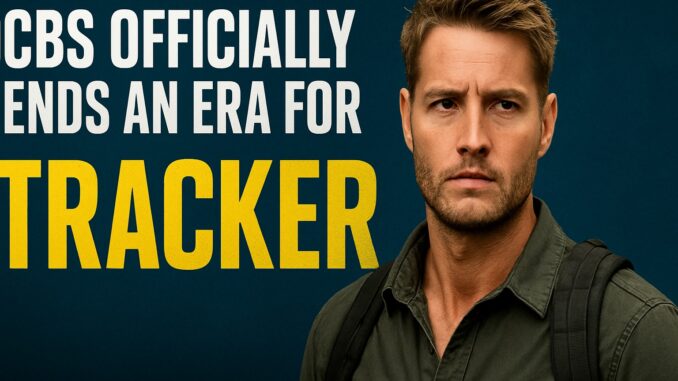
If you’re a fan of the action-drama series Tracker on CBS, you might have sensed the tremors: changes in cast, tone, structure—and now, the network has officially declared that one era of the show is over. But what does that really mean for its star, Justin Hartley, and for the series itself? Let’s dive in.
The End of an Era at CBS for Tracker
What has changed?
After a successful run, CBS is making some fundamental shifts in Tracker’s structure. According to reports, the network is bidding goodbye to the original format and cast lineup that helped establish the show. The phrase “end of an era” is being used deliberately to reflect that more than just minor tweaks are happening.
Why the network is doing it
Networks don’t make big declarations lightly. In Tracker’s case, the changes appear driven by several factors: cast departures (including key characters), the need to refresh story arcs, and a desire to maintain or grow viewership as the show moves deeper into its lifecycle.
What’s staying the same
Importantly, Justin Hartley remains firmly at the centre of the show, reprising his role as Colter Shaw—the survivalist tracker. So while the “era” of how the show operated is changing, the anchor remains.
Who is Justin Hartley’s Colter Shaw—and Why He Matters
Character overview
In Tracker, Hartley plays Colter Shaw: a loner, survivalist specialist, reward-seeker who helps law enforcement and citizens find missing people or objects. His background is unconventional—off-grid childhood, survival training, family fractures—all elements that give depth to the character.
Hartley’s real-life star power
Justin Hartley isn’t new to high-profile TV. His involvement elevates the show’s profile, and as the lead and executive producer, he brings creative weight. That matters when a show is undergoing a big shift.
The Major Shifts You Should Know About
Departing cast members
One of the key indicators of an era ending: original cast departures. For Tracker, two regulars—Abby McEnany and Eric Graise (who played Velma Bruin and Bobby Exley) will not return.
New direction for story arcs
Season 3 opens with a two-part premiere that deals with major family secrets for Colter, which hints at a deeper and darker narrative shift.
Visual and tonal changes
While not explicitly spelled out, “end of an era” often signals changes in tone, filming style, or pace. Expect Tracker to lean heavier into serialized drama rather than purely episodic cases, as the family mystery becomes more central.
What It Means for the Show’s Future
Opportunities for growth
With major shifts come opportunities. Tracker can reinvent itself, attract new viewers, deepen its mythology, and sustain longevity. Fresh storylines can rejuvenate interest.
Risks to watch
Any change risks alienating loyal fans who loved the original format. New arcs and missing characters may cause some drop-off. Timing matters too: schedule changes or hiatuses can hurt momentum.
Platform and streaming implications
The TV landscape is more fluid than ever. With streaming and broadcast merging, Tracker’s changes might also reflect broader strategic moves by CBS and its streaming partners. Season 3 is already confirmed.
For Justin Hartley – What Does This Shift Mean?
More creative say
As lead actor and EP, Hartley is likely getting more creative say—especially given the bold move to pivot the show. That gives him both opportunity and responsibility.
Brand reassurance
Hartley has kept his brand intact. While the show changes around him, he remains the face and driving force. That’s good for his longevity.
A chance to evolve his character
For Hartley, this era-ending move is a chance to break free from the formula, evolve Colter Shaw into something new, and show range. Fans saw the survivalist hero; now they may see the vulnerable family man, the hunted, the protagonist at risk.
How Fans Should Prepare
Catch up on what you’ve missed
If you haven’t watched the latest episodes, now’s the time. Season 3 builds on Season 2’s cliffhanger and the cast changes.
Adjust expectations, embrace change
Don’t expect exactly the same show you loved before. Embrace the new direction: more serialized arcs, bigger stakes, and fewer familiar faces.
Tune in early and stay locked in
When an era ends, you want to be front row for the next one. Season 3’s premiere kicks off important threads. Set reminders. Join the conversation.
Why This Move Makes Business Sense
Network longevity & brand refresh
TV shows plateau. To keep things fresh, networks often pivot rather than cancel outright. CBS is choosing evolution over termination.
Competition & streaming pressures
With more content than ever, shows must stand out. Tracker’s shift might be a strategic move to align with viewer behaviors and streaming metrics.
H2: Leveraging star power, preserving investment
Rather than losing Hartley or the show, CBS keeps the star but tweaks the format—a smart investment in an existing asset.

What Could Go Wrong—and How It Might Be Mitigated
Viewer drop-off risks
Whenever a show changes significantly, you risk losing core viewers who preferred the old formula. Continuity, marketing, and messaging will be key.
Narrative overreach
Shifting to more serialized, heavy arcs means risk of convoluted storytelling or misaligned pacing. The writers will need to balance episodic satisfaction with the bigger mystery.
Scheduling & accessibility
As one article noted, scheduling disruptions already frustrate fans. CBS must ensure that the new era isn’t hindered by poor timing or viewer access.
Lessons for Other TV Shows & Networks
Evolution over cancellation
Shows can refresh instead of ending. The “end of an era” is sometimes just a transition.
Star-centric reformulation
If a show’s lead is strong, reformulating around that lead can maintain continuity and loyalty while changing surrounding elements.
Communication matters
Labeling something “end of an era” prepares the audience psychologically. Fans respond better when they feel part of the change.
What Fans Are Saying
Feedback online has been mixed: excitement about the new direction, concern about missing characters, and criticism aimed at scheduling issues. One comment captured it:
“And if you record it, you end up losing the end … this is exactly why Sunday night shows on #CBS get canceled!”
Fans want consistency, and they want the show to honor the past while embracing the future.
Final Thoughts
Change is never easy, but it can be necessary. For Tracker, CBS is signaling that the original era succeeded—and now it’s time for something new. For Justin Hartley, this is not a sidestep but an elevation. He remains at the heart of the series, and if you’re watching closely, you’ll see the story expressed in bolder, deeper ways. Whether you loved the original format or are just tuning in now, this shift is worth watching.
Conclusion
The announcement that CBS is officially ending an era for Tracker marks a meaningful pivot. It confirms what many viewers suspected: the series is ready to evolve, to delve deeper, and to reposition itself in an increasingly competitive TV landscape. For Justin Hartley, it’s a moment of either reaffirmation or reinvention—and likely a bit of both. So as we step into this new phase of the show, buckle up: the hunt gets darker, the stakes higher, and the character we thought we knew may surprise us yet.
